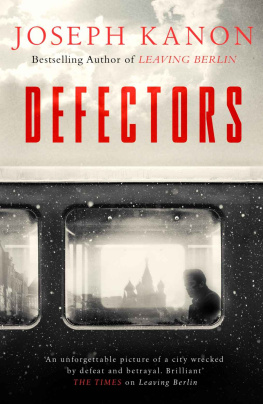Joseph Kanon - Alibi
Here you can read online Joseph Kanon - Alibi full text of the book (entire story) in english for free. Download pdf and epub, get meaning, cover and reviews about this ebook. genre: Detective and thriller. Description of the work, (preface) as well as reviews are available. Best literature library LitArk.com created for fans of good reading and offers a wide selection of genres:
Romance novel
Science fiction
Adventure
Detective
Science
History
Home and family
Prose
Art
Politics
Computer
Non-fiction
Religion
Business
Children
Humor
Choose a favorite category and find really read worthwhile books. Enjoy immersion in the world of imagination, feel the emotions of the characters or learn something new for yourself, make an fascinating discovery.

- Book:Alibi
- Author:
- Genre:
- Rating:5 / 5
- Favourites:Add to favourites
- Your mark:
- 100
- 1
- 2
- 3
- 4
- 5
Alibi: summary, description and annotation
We offer to read an annotation, description, summary or preface (depends on what the author of the book "Alibi" wrote himself). If you haven't found the necessary information about the book — write in the comments, we will try to find it.
Alibi — read online for free the complete book (whole text) full work
Below is the text of the book, divided by pages. System saving the place of the last page read, allows you to conveniently read the book "Alibi" online for free, without having to search again every time where you left off. Put a bookmark, and you can go to the page where you finished reading at any time.
Font size:
Interval:
Bookmark:
Joseph Kanon
Alibi
CHAPTER ONE
After the war, my mother took a house in Venice. Shed gone first to Paris, hoping to pick up the threads of her old life, but Paris had become grim, grumbling about shortages, even her friends worn and evasive. The city was still at war, this time with itself, and everything shed come back for-the big flat on the Rue du Bac, the cafes, the market on the Raspail, memories all burnished after five years to a rich glow-now seemed pinched and sour, dingy under a permanent cover of gray cloud.
After two weeks she fled south. Venice at least would look the same, and it reminded her of my father, the early years when they idled away afternoons on the Lido and danced at night. In the photographs they were always tanned, sitting on beach chairs in front of striped changing huts, clowning with friends, everyone in caftans or bulky one-piece woolen bathing suits. Cole Porter had been there, writing patter songs, and since my mother knew Linda, there were a lot of evenings drinking around the piano, that summer when theyd just married. When her train from Paris finally crossed over the lagoon, the sun was so bright on the water that for a few dazzling minutes it actually seemed to be that first summer. Bertie, another figure in the Lido pictures, met her at the station in a motorboat, and as they swung down the Grand Canal, the sun so bright, the palazzos as glorious as ever, the whole improbable city just the same after all these years, she thought she might be happy again.
A week later, with Bertie negotiating in Italian, she leased three floors of a house on the far side of Dorsoduro that once belonged to the Ventimiglia family and was still called Ca Venti. The current owner, whom she would later refer to, with no evidence, as the marchesa, took clothes, some silver-framed family photographs, and my mothers check and moved to the former servants quarters on the top floor. The rest of the house was sparsely furnished, as if the marchesa had been selling it off piece by piece, but the piano nobile, all damask and chandeliers, had survived intact, and Bertie made a lend-lease of some modern furniture from his palazzo on the Grand Canal to fill a sitting room at the back. The great feature was the light, pouring in from windows that looked out past the Zattere to the Giudecca. There were maids, who came with the house without seeming to live there, a boat moored on the canal, and a dining room with a painted ceiling that Bertie said was scuola di Tiepolo but not Tiepolo himself. The expatriate community had begun to come back, opening shuttered houses and planning parties. Coffee and sugar were hard to get, but wine was cheap and the daily catch still glistened and flopped on the market tables of the pescaria. La Fenice was open. Mimi Mortimer had arrived from New York and was promising to give a ball. Above all, the city was still beautiful, every turn of a corner a painting, the water a soft pastel in the early evening, before the lamps came on. Then the music started at Florians and the boats rocked gently at the edge of the piazzetta, and it all seemed timeless, lovely, as if the war had never happened.
I learned all this many weeks later in a telephone call she had somehow managed to put through by going to the top. At this time the trunk lines into Germany were reserved for the military, so I imagined that a general, some friend of a friend, had been charmed or browbeaten into lifting a few restrictions. The call, in any case, caused a lot of raised eyebrows in the old I. G. Farben building outside Frankfurt where I pushed files into one tray or another for US-FET while I waited for my separation papers. I had been in Germany since the beginning of the year, first with G-2, then attached to one of the de-Nazification teams separating the wicked from the merely acquiescent. Frankfurt was still a mess, the streets barely passable, filled with DPs and hollow-eyed children with edema bruises. The phone call, with its scratches and delays, seemed to come from another world, so far from the rubble and desperation just outside my window that its news seemed irrelevant. The marchesa was quiet; you hardly knew she was there (darling, not even a flush ). My room had a wonderful view. Her pictures hadnt arrived from New York yet, but Bertie, a treasure and fluent, was looking into it. It was a call that began in what my father used to call her medias res-a plunge into the middle of whatever she was thinking, followed by exasperation when you didnt know what she was talking about. Finally I understood that she had moved to Venice intending to stay, which meant that my home would be there too. The point of the call, in fact, was to say she was expecting me for Christmas.
Im still in the army.
Well, they give passes, dont they? I mean, its not as if the wars still on. And Im sure you could use the break. Ive seen the newsreels-it looks just awful there.
Yes. Camps full of corpses, wheeled out in farm carts to mass graves. Feral kids eating out of PX garbage cans. Women passing bricks hand over hand, digging out. Not what anyone had expected, pushing over the Rhine. GIs rich with a pack of Luckies. What happens after.
Well, then, she said. Wont it be wonderful? To have Christmas together? Its been years.
In a Fascist country, I said, half teasing.
Its not the same thing at all. They werent Nazis. Anyway, all thats over. Its lovely here, just like before. I cant wait for you to see the house. Maybe itll snow. They say its enchanting in the snow.
Characteristically, she hung up without giving me her address, so it was to Bertie that I later wrote to say that Id be spending Christmas in the hospital. After surviving actual combat and the tough early days of the occupation, what got me, embarrassingly, was a rusty nail, a careless step in the debris of a Frankfurt street that caused a puncture wound and required tetanus treatment and a holiday spent with amputees and boys with nervous tics. By the time I finally got to Venice it was February, I was out of the army, and the city was huddled against a damp, misty cold.
The piano nobile, as grand and formal as described, was freezing, kept dark but not draftless by long, heavy drapes. The sitting room, warmed by space heaters from Bertie, was comfortable, but the high Tiepolo dining room made meals so chilly and unpleasant that my mother had taken to eating in the kitchen or off a tray sitting next to the bars of her electric fire. Above us, the marchesa had become so silent that a maid was sent up to check, as if she might be one of those birds who grow still on a winter branch, then suddenly fall over. What would have changed everything was sun, cutting across the Adriatic to seep into all the tile roofs and parquet floors as it often did even in February, but the sky that winter was German, cloudy and gray. In the evenings, near our house, there was no light at all. A fog would come in from the sea, filling the Giudecca channel, streetlights were spaced far apart to save power, and the calles became dark medieval paths again, designed for people with torches.
I noticed none of this-or rather, it was all so like the gray I was used to that I accepted it as natural, the way things were. The gloomy afternoons were no different from the weather in my head, full of listless shadows, an urge to draw in. Does anyone really come back from the war? The lucky ones just keep going, on to the next fight, unaware that theyre breathing different air. The rest of us have to be brought up in stages, like deep-sea divers, to prevent the bends. The boys in the hospital had come back too fast-their faces twitched, their eyes darted at every sound, prey. I slept. The fog that came in at night from the lagoon would fill my head too, a lulling numbness, asking to be wrapped in blankets, left alone. Sometimes there were dreams-really ways of going back, reminders of the nightmare time that was supposed to be over-but mostly the sleep was just fog, opaque and shapeless.
Font size:
Interval:
Bookmark:
Similar books «Alibi»
Look at similar books to Alibi. We have selected literature similar in name and meaning in the hope of providing readers with more options to find new, interesting, not yet read works.
Discussion, reviews of the book Alibi and just readers' own opinions. Leave your comments, write what you think about the work, its meaning or the main characters. Specify what exactly you liked and what you didn't like, and why you think so.





